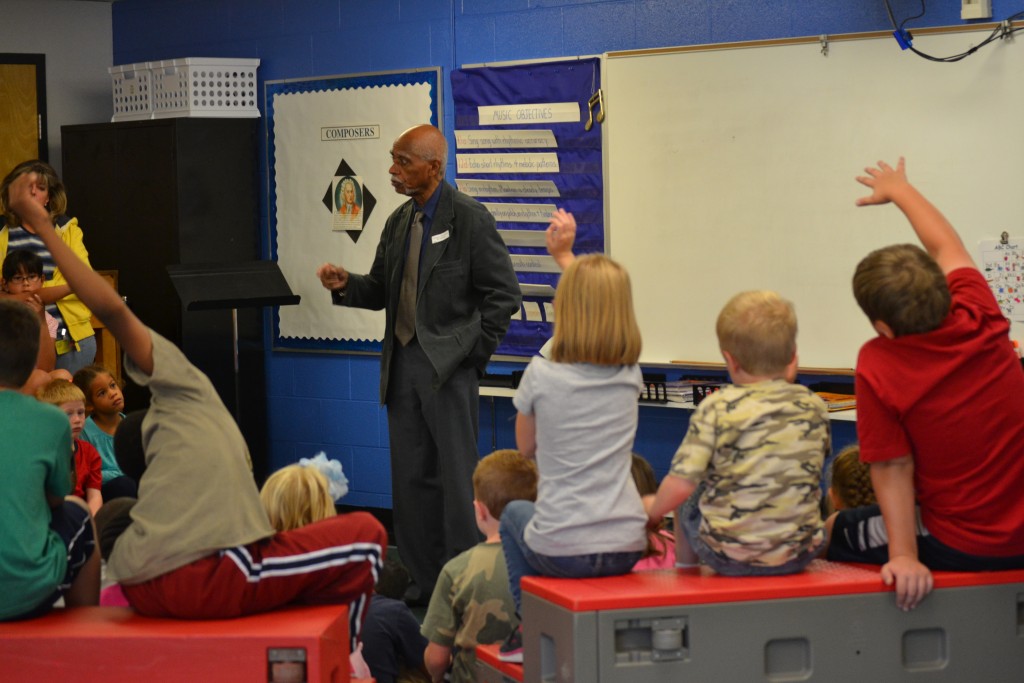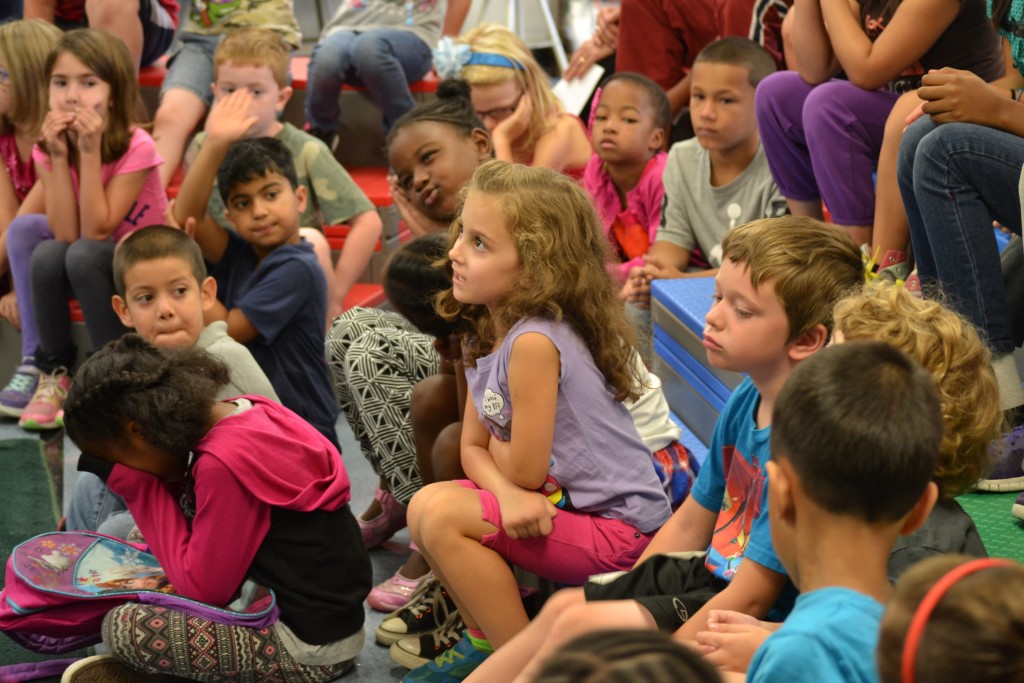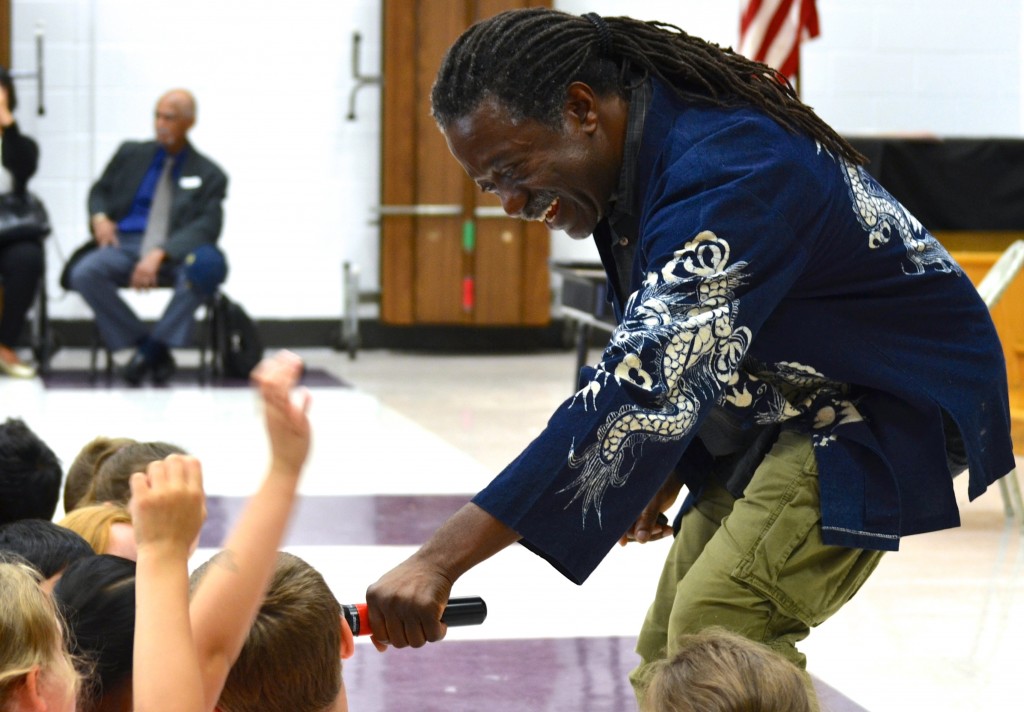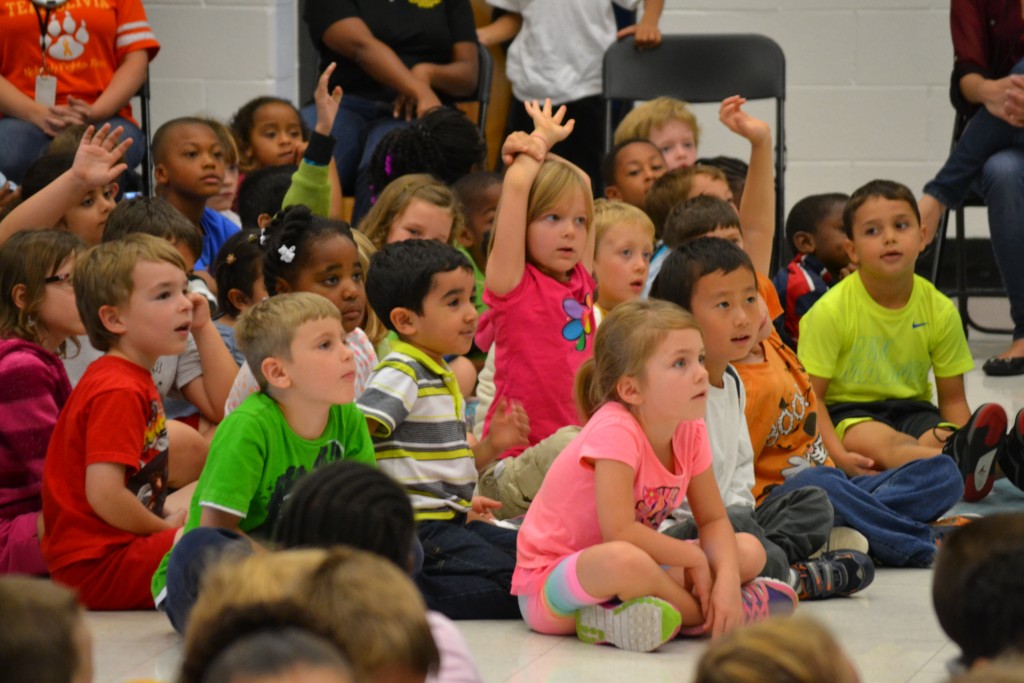Story and photos by Jo Mathis/AAPS District News
Stay in school and work hard so that one day you will do what you were born to do.
That was the message University of Michigan professors George Shirley and Herbert G. Winful gave to Carpenter Elementary children Friday during The HistoryMakers’ Back to School Day.
“It’s very important that you understand, even at this very young age, that if you want to live a life that is rewarding and gives you happiness and makes you feel good, then you have to prepare yourselves,” Shirley, a distinguished opera singer, told the students. “You have to stay in school so that all of the good things that you’ve been blessed with from birth—all of your talents and all of your abilities—you will have the chance to develop so that after you get your degree and start your professional lives, you will do what you were born to do.”

Shirley and Winful were two of more than 400 black role models who visited students at schools across 32 states to encourage them to take a pledge to say in school.
The HistoryMakers is a national 501(c)(3) non profit educational institution founded in 1999 to preserve, develop and provide easy access to an internationally recognized, archival collection of thousands of African American video oral histories. The collection houses 7,000 hours of African American testimony on videotape.
Carpenter’s music teacher, Ann Marie Borders, has invited Shirley to talk to her students for years, and when The HistoryMakers started holding stay-in-school commitment ceremonies six years ago, she jumped at the chance to have him come for that, as well.

Shirley told the students that after graduating from college (Wayne State University in 1955), he became a teacher in Detroit before was drafted into the Army.
It was while Shirley was the first African-American member of the U.S. Army Chorus that someone suggested he could be an opera singer. He looked into it, and realized he could indeed.
“That has led to a life that’s been very fulfilling,” said Shirley, who began teaching again at the University of Michigan in 1980 after singing opera all over the world.
“I’ve had a wonderful life doing things I was not expected to do, and that I didn’t even think I could do. All of you sitting here don’t know what’s going to happen with your lives, but this is the place to find out from all of your teachers just who you are. The process of finding out just who you really are begins here.”
Winful talked about his work as an electrical engineer and a professor of electrical engineering, and received many enthusiastic replies when he asked the students about what they want to do when they grow up.

“If you want to be an engineer, you have to like to build stuff, and you have to like math and science,” said Winful, who grew up in Ghana. “You should promise to work very hard, study very hard, and be very good at math and science, and then you can be an engineer.”
Winful talked about the engineers who built the Mackinac Bridge, which he called one of the most beautiful bridges in the world. “To design a bridge that doesn’t fall down, you need to use a lot of math, geometry, algebra,” he said.
Borders says the students’ feedback has been positive, and included the following take-away quotes:
- “You have to believe to achieve.”
- “Follow your dreams and work hard to be who you want to be.”
- “My brain is a train and it runs on brain food.”
- “We have to stay in school and keep learning. I will do that because I want to be a doctor.”
- “When someone tells you to do something bad, just say no and walk away.”
- “I want to be a nurse and help people.
-

Kindergarteners pay close attention to the message.
David Robinson, spokesperson for The HistoryMakers based in Chicago, says he remembers when the average African American family was essentially intact across every class level.
“That meant that multi-generational relatives and their friends were always around and they told magnificent and fascinating stories about history and nearly everything else,” recalls Robinson. “When my uncle Percy or my grandfather talked about Duke Ellington, or what we did during the war years, or Joe Louis, or racism at the factory, I felt like I was there. As I grew older, I came to realize that much of my values and character, most of the lesson I taught my own kids, came from being around those relatives and their stories.”
But times have changed, he says, adding: “I have observed that many young people today don’t have access to that rich, deep, colorful wisdom—but for the HistoryMakers and others like them who choose to visit and share with these students.”
Teaching has always been a top priority for Shirley.
“I believe that everything that one does in life must give back to little people,” he said following the presentation. “They’re the roots that grow the trees. And if experience has any value at all, then it has to be transplanted in young people.
“The experiences I’ve had as a professional singer, for those young people who want careers, I have to give that back. For children who at this point are open to whatever it is that comes for them to be able to hear from people who’ve done things that it’s possible for them to do whatever their dream is. It’s important. It’s a necessity.”

Thanks, Jo, for covering this event!